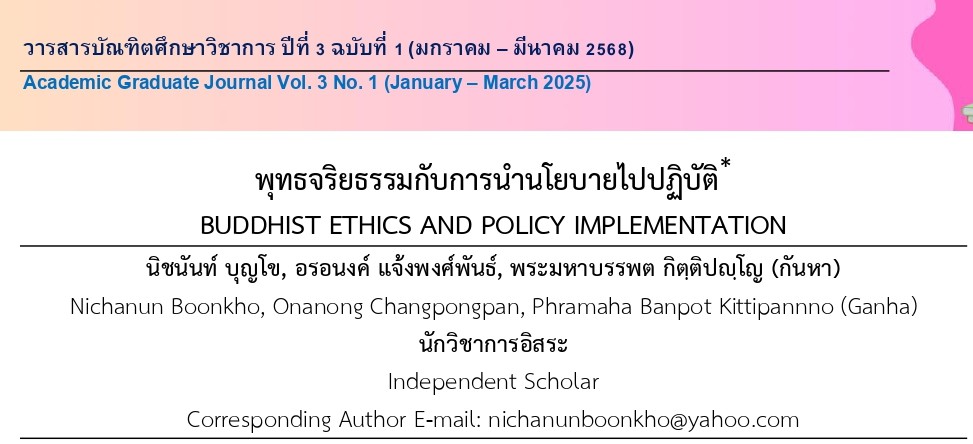BUDDHIST ETHICS AND POLICY IMPLEMENTATION
Keywords:
Buddhist Ethics, Policy ImplementationAbstract
This article is a study about “Buddhist ethics and policy implementation”. Implementing a policy or transferring a policy to practice is the implementation of what has been determined in the work of the government sector to create results for the people. At present, the government has set a policy to be a digital government. Therefore, there must be changes from within, both from the legal framework and the policy framework, that will require government agencies to upgrade the quality of services to a digital government. External pressures and challenges are also important factors that must be accelerated to develop faster. In every step related to policy implementation, both at the macro and micro levels, every agency from the ministerial, ministry, and department level to the people must have the intention to practice seeing results. It must have honesty, consisting of physical honesty, good conduct with the body, verbal honesty, good conduct with speech, and mental honesty, good conduct with the mind. Must act as a person who works with dignity, not seeking improper or undue benefits or seeking personal benefits from performing duties by using influence, power, duties and responsibilities to create personal benefits and have adverse effects on the agency, which is called a conflict of interest. To protect the government's interests, the government's interests must be protected in the administration and spending of the national budget efficiently and economically. Maintain government assets in good condition and provide maximum benefit. To maintain righteousness and legitimacy, we must adhere to the principles of righteousness and legitimacy according to the principles of good governance in our conduct and the performance of all our duties.
References
ณัฐฐา วินิจนัยภาค. (2555). นโยบายสาธารณะและการจัดการเชิงกลยุทธ์. กรุงเทพฯ: คณะรัฐประศาสนศาสตร์. สถาบันบัณฑิตพัฒนบริหารศาสตร์.
ธีรพัฒน์ อังศุชวาล. (2567). ปัญหาของการนำนโยบายสาธารณะไปปฏิบัติในประเทศไทย. สืบค้น 23 พฤษภาคม 2567, จาก http://www.public-law.net/publaw/view.aspx?id=1758.
ประสิทธิ์ โฆวิไลกุล. (2548). กฎหมายแพ่ง : หลักทั่วไป คำอธิบายประมวลกฎหมายแพ่งและพาณิชย์มาตรา 4-14. กรุงเทพฯ: สำนักพิมพ์นิติธรรม.
ปรีดี เกษมทรัพย์. (2519). กฎหมายแพ่ง : หลักทั่วไป. กรุงเทพฯ: เจริญวิทย์การพิมพ์.
พระพรหมคุณาภรณ์ (ป.อ. ปยุตฺโต). (2556). พจนานุกรมพุทธศาสน์ ฉบับประมวลศัพท์ (พิมพ์ครั้งที่ 21). กรุงเทพฯ: บริษัท สำนักพิมพ์เพ็ทแอนด์โฮม จำกัด.
พระมหาโพธิวงศาจารย์ (ทองดี สุรเตโช). (2558). ศัพท์วิเคราะห์ พจนานุกรมเพื่อการศึกษาพุทธศาสน์ (พิมพ์ครั้งที่ 3). กรุงเทพฯ: โรงพิมพ์เลี่ยงเชียง.
พระมหาสมปอง มุทิโต. (2542). ในพระมหาโมคัลลานเถระ คัมภีร์อภิธานัปปทีปิกา. (แปลเรียบเรียง). คัมภีร์อภิธานวรรณนา. กรุงเทพฯ: โรงพิมพ์ธรรมสภา.
มยุรี อนุมานราชธน. (2556). นโยบายสาธารณะ (พิมพ์ครั้งที่ 4). กรุงเทพฯ: แอคทีฟ พริ้น.
มหาวิทยาลัยมหาจุฬาลงกรณราชวิทยาลัย. (2539). พระไตรปิฎกฉบับภาษาไทย ฉบับมหาจุฬาลงกรณราชวิทยาลัย. กรุงเทพฯ: โรงพิมพ์มหาจุฬาลงกรณราชวิทยาลัย.
ราชบัณฑิตยสถาน. (2556). พจนานุกรม ฉบับราชบัณฑิตยสถาน พ.ศ. 2554 (พิมพ์ครั้งที่ 2). กรุงเทพฯ: ราชบัณฑิตยสถาน.
วรเดช จันทรศร. (2554). ทฤษฎีการนำนโยบายสาธารณะไปปฏิบัติ (พิมพ์ครั้งที่ 5). กรุงเทพฯ: สมาคมนักวิจัยมหาวิทยาลัยไทย.
ศุภชัย ยาวะประภาษ. (2554). นโยบายสาธารณะ (พิมพ์ครั้งที่ 9). กรุงเทพฯ: สำนักพิมพ์แห่งจุฬาลงกรณ์มหาวิทยาลัย.
สมบัติ ธำรงธัญวงศ์. (2554). นโยบายสาธารณะ : แนวความคิด การวิเคราะห์ และกระบวนการ. พิมพ์ครั้งที่ 22. กรุงเทพฯ: คณะรัฐประศาสนศาสตร์ สถาบันบัณฑิตพัฒนบริหารศาสตร์.
หยุด แสงอุทัย. ความรู้เบื้องต้นเกี่ยวกับกฎหมายทั่วไป. กรุงเทพฯ: โรงพิมพ์มหาวิทยาลัยธรรมศาสตร์, 2519.
Ditto. (2567). รัฐบาลดิจิทัลคืออะไร สำคัญกับสถานการณ์ปัจจุบันอย่างไรบ้าง?. สืบค้น 30 สิงหาคม 2567, จาก https://www.dittothailand.com/dittonews/gov-what-is-digital-government/.







